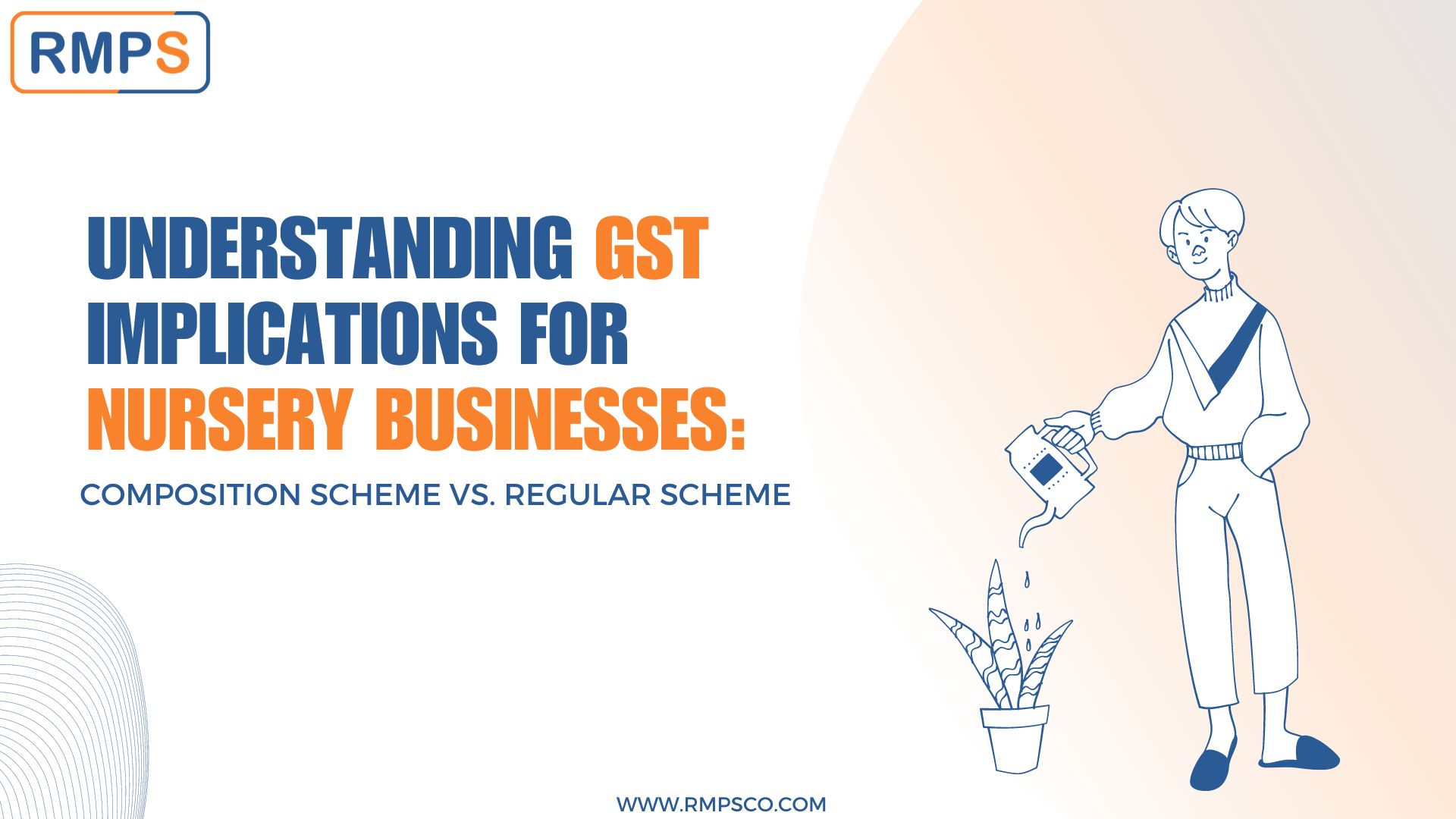
In India, the Goods and Services Tax (GST) regime offers different schemes for small and medium businesses, primarily the Composition Scheme and the Regular Scheme. For nursery businesses, understanding these options and their implications is crucial for optimal tax management. This blog will delve into the GST rates applicable to nursery businesses and discuss the strategic choice between the Composition Scheme and the Regular Scheme.
GST Rates for Nursery Businesses
Nursery businesses are subject to varying GST rates depending on how their products and services are sold:
- Nursery Plants Sold Without Pots/Containers: Exempt from GST.
- Nursery Plants Sold With Pots/Containers: GST at 5%.
- Planting Services from Nursery or Gardening Service Providers: GST at 18%.
These variations mean that how you package and sell your plants can significantly impact your GST obligations.
The Composition Scheme
The Composition Scheme is designed for small taxpayers, allowing them to pay GST at a fixed rate on their turnover. Key features include:
- GST Rate: 6% for service providers under the Composition Scheme.
- Compliance: Simplified with quarterly returns instead of monthly.
- Input Tax Credit (ITC): Not claimable under this scheme.
Benefits of the Composition Scheme:
- Simplified compliance and reduced paperwork.
- Lower tax rates, beneficial for businesses with lower turnover.
Drawbacks of the Composition Scheme:
- Inability to claim ITC, which can be a disadvantage if your input costs are high.
- Limited to businesses with an annual turnover up to ₹1.5 crores for goods and ₹50 lakhs for services.
The Regular Scheme
Under the Regular Scheme, businesses pay GST at standard rates and can claim ITC on their inputs. Key features include:
- GST Rate: Varies based on product/service (e.g., 5% for plants in pots, 18% for planting services).
- Compliance: Monthly returns and invoices.
- Input Tax Credit (ITC): Fully claimable.
Benefits of the Regular Scheme:
- Ability to claim ITC, which can reduce the overall tax liability.
- Suitable for businesses with higher turnover and significant input costs.
Drawbacks of the Regular Scheme:
- More complex compliance requirements.
- Higher tax rates on some services (e.g., 18% on planting services).
Strategic Choice: Composition Scheme vs. Regular Scheme
Choosing between the Composition Scheme and the Regular Scheme depends on several factors:
- Turnover and Scale: If your turnover is below the thresholds mentioned above, the Composition Scheme might be attractive for its simplicity and lower rates.
- Nature of Sales: If your business primarily sells plants without pots, thereby exempt from GST, the Regular Scheme might offer more benefits as you can claim ITC on any inputs.
- Input Costs: If your input costs are significant and you want to claim ITC, the Regular Scheme is the better choice. For instance, if you frequently buy pots, soil, and other materials, the Regular Scheme allows you to reduce your GST liability through ITC.
- Service Component: If your business includes a significant portion of planting services taxed at 18%, the Composition Scheme might reduce your tax burden due to the 6% rate. However, foregone ITC could offset this benefit.
Example Scenario
Consider a nursery business that:
- Sells plants in pots (GST @ 5%).
- Offers planting services (GST @ 18%).
If you opt for the Composition Scheme, you pay 6% on your total turnover but cannot claim ITC. In contrast, the Regular Scheme lets you claim ITC, which can be significant if your input costs are high.
For instance, if your annual turnover is ₹30 lakhs, and your input costs (with GST) are ₹10 lakhs:
- Composition Scheme: You pay 6% of ₹30 lakhs = ₹1.8 lakhs in GST, without ITC.
- Regular Scheme: You pay 5% on plant sales and 18% on services but can claim ITC on ₹10 lakhs of inputs. The actual tax liability will depend on the precise mix of sales and services.
Conclusion
In conclusion, the choice between the Composition Scheme and the Regular Scheme should be based on your business’s turnover, nature of sales, and input costs. For nursery businesses, understanding these nuances is crucial to optimize tax payments and compliance. If you frequently sell plants in pots and offer planting services, detailed analysis and consultation with a tax professional can help you make the best decision.
LinkedIn Link : RMPS Profile
This article is only a knowledge-sharing initiative and is based on the Relevant Provisions as applicable and as per the information existing at the time of the preparation. In no event, RMPS & Co. or the Author or any other persons be liable for any direct and indirect result from this Article or any inadvertent omission of the provisions, update, etc if any.
Published on: June 18, 2024
